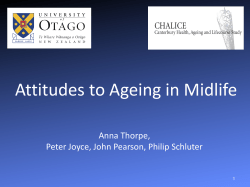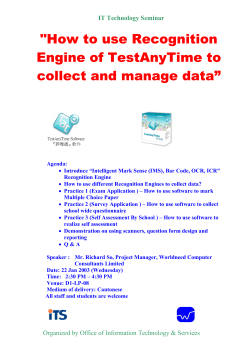
Understand the factors affecting older people
Unit Title: Sector unit number: Level: Credit value: Guided learning hours: Unit reference number: Understand the factors affecting older people HSC 3072 3 2 17 D/504/2243 Unit purpose and aim This unit covers an understanding of older people, the impact of ageing, the range of factors that impact on older people and the role played by society. The unit promotes a person-centred approach as an underpinning value in working with older people. Learning Outcomes The Learner will: 1 Understand the impact of the ageing process on older people Assessment Criteria The Learner can: 1.1 Describe changes that may come with ageing Teaching Content Older people are defined as those who are over 50 1.2 Explain how the experience of the ageing process is unique to each individual 1.3 Analyse the potential impact of factors associated with ageing on older people to include: Physical Emotional Social Cognitive Environmental Financial/Economic 1.4 Describe how a positive approach to ageing can contribute to the health & wellbeing of an individual 2 Understand attitudes of society to older people The individual is the person requiring care or support 2.1 Describe the contributions to society made by older people 2.2 Explain what is meant by age discrimination Age discrimination may include any legal definition where one exists 2.3 Explain how societal attitudes and beliefs impact on older people © OCR 2014 1 Learning Outcomes Assessment Criteria Teaching Content 2.4 Describe strategies that can be used to challenge stereotypes and discriminatory attitudes towards older people 3 Understand the importance of using person centred approaches with older people 3.1 Describe how the effects of ageing can affect the day to day life of older people 3.2 Describe ways of using a person centred approach to support older people to maintain health and well being in day to day life 3.3 Explain the importance of social inclusion for older people 3.4 Outline barriers to social inclusion for older people 3.5 Describe ways of using a person centred approach to enable older people to make positive contributions to their community Person centred approach is one that fully recognises the uniqueness of the individual and establish this as the basis for planning and delivery of care and support. The approach promotes dignity for older people Day to day life may include: relationships family role social status access to community facilities personal care independence lack of social support lack of material well being education opportunities housing employment access to social and leisure activities health care sensory loss Community may include: neighbourhood family group religious communities ethnic communities environment clubs and societies political and professional groups 4 Understand the importance of independence for older people 4.1 Explain how independence can contribute to the well being of older people 4.2 Describe how to support older people to maintain independence 4.3 Describe how older people can be in control of decision making about their care and support needs 2 © OCR 2014 Learning Outcomes Assessment Criteria Teaching Content 4.4 Explain how to encourage older people to take positive risks Assessment Units need to be assessed in accordance with Skills for Care's QCF Assessment Principles. Assessment decisions for competence based learning outcomes (e.g. those beginning with ‘Be able to’) must be made in a real work environment by an occupationally competent assessor. Any knowledge evidence integral to these learning outcomes may be generated outside of the work environment but the final assessment decision must be within the real work environment. This unit is competence based. This means that it is linked to the candidate's ability to competently perform a range of tasks connected with their work. This unit may be assessed using any method, or combination of methods, which clearly demonstrates that the learning outcomes and assessment criteria have been met. This unit requires workplace assessment of occupational competence. Competence based assessment must include direct observation as the main source of evidence. Guidance on assessment and evidence requirements OCR does not stipulate the mode of delivery for the teaching of the content of this unit. Centres are free to deliver this unit using any mode of delivery that meets the needs of their candidates. Centres should consider the candidates’ complete learning experience when designing learning programmes. Details of relationship between the unit and national occupational standards This unit has been developed by Skills for Care in Partnership with Awarding Organisations. It provides a key progression route between education and employment (or further study/training leading to employment). It is directly relevant to the needs of employers and relates to national occupational standards developed by Skills for Care. Additional information For further information regarding administration for this qualification, please refer to the OCR document ‘Administrative Guide for Vocational Qualifications’ (A850). This unit is a shared unit. It is located within the subject/sector classification system 01.3 Health and Social Care. © OCR 2014 3
© Copyright 2025





















